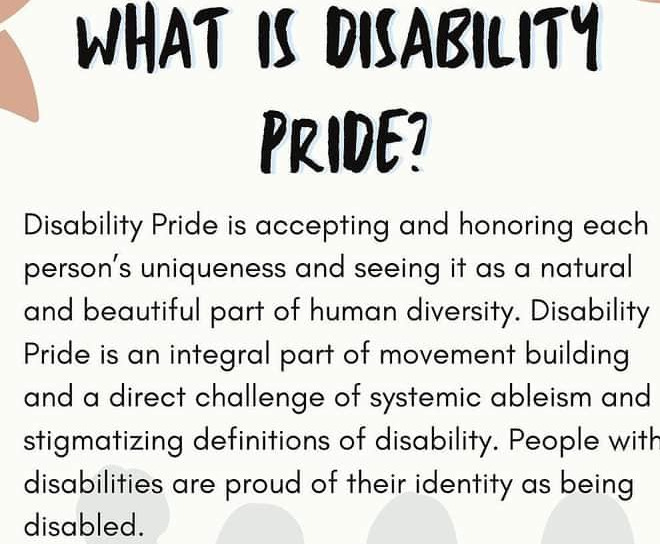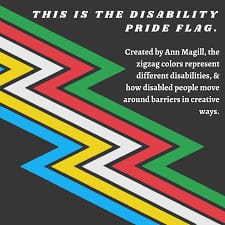Disability Pride Month Through the Eyes of Faith
Why I celebrate Disability Pride Month a disabled Christian..From Where I Sit
July is Disability Pride Month — Intended to commemorate the Americans with Disabilities Act(ADA) being signed into law on July 26th, 1990, it’s a time that invites us to reflect on the dignity and value of people with disabilities, or so I thought. For some, the word “pride” might raise red flags, especially in light of my recent post on why I can’t celebrate Gay Pride Month. But before you assume hypocrisy, let me be clear: Disability Pride isn’t about celebrating or condoning sin — it’s about affirming that our bodies, even in their limitations, are “fearfully and wonderfully made” (Psalm 139:14). It’s about reclaiming our place in the community, in the Body of Christ, where “the parts that seem weaker are indispensable” (1 Corinthians 12:22). Disability Pride Month reminds us that diversity in ability is not a flaw to be erased, but a gift to be honored, a strength to be shared — both in the church and in creation.
So, What’s There to Be Proud Of?
Every year, without fail, someone asks me: “Why be proud to be disabled? There’s nothing to be proud about.” Honestly? I get it. I know firsthand that living with a disability isn’t glamorous. It’s pain, it’s struggle, it’s extra costs, and it’s a daily challenge that most people take for granted, for example. You know those pain scales they give you in hospitals? For me, “zero” is a mythical creature. On a good day, I’m at a three. On a bad day? I wish there were a scale that went that high, or maybe we could get a whole new system for chronic pain. (Any pain management docs reading this? I’d love to hear your thoughts in the comments.)
My Challenge, My Story
If you’ve read my blogs before, you probably know I call my disability a “Challenge.” It’s not just a part of my life—it’s shaped how I read the Bible, how I understand God, and how I interact with the world. Without my Challenge, I wouldn’t be me. That doesn’t mean it’s easy; some days, just getting out of bed feels, and often is, impossible. Everything costs more: from medical bills to adaptive equipment, and every day I read another bigoted, ableist comment on Facebook, usually directed toward parents of disabled children.. Every day is a new challenge—hence why I call my disability a challenge. We deal with challenges that most able-bodied people take for granted (more on that later). I talk a little bit about it in my book, but I don’t think I’ve mentioned it here…Anyway, I got saved when I was in High school; before that, I was a mess. On the outside, I was a Christian; I did and said all the right things, but inside, I wasn’t so sure; oh, I believed God existed, I was just sure he hated me. Why give a disability to someone you love? Anyway, I was at Youth camp, when some of the counselors asked to pray over me; at first I protested, saying that god doesn’t heal those he hates; he does just not in the ways we might think.. I cover that in Wounded for us
Don’t Get It Twisted
Disability Pride isn’t about being proud of our disabilities. It’s not about celebrating pain or struggle for its own sake. No one is doing that…Being disabled is exhausting, on a good day, and debilitating on the bad days. I’ve taken enough medicine to kill a pony; just to sit at the computer and write this, now compound that of my visible challenge with the mental drain from my Attention Deficit Hyperactivity Disorder.. I’ve already mentioned having to roll through a slew of stupid Social Media comments, that’s draining for anyone. So, to answer your unasked question: No, people who have disabilities aren’t proud to be disabled.. Disability Pride Month is about recognizing how far we’ve come, both as individuals and as a community, and about bringing awareness to the fact that we still have a long way to go. It’s about acknowledging the strength it takes to keep going, even when the world isn’t built for us. And it’s about reminding everyone that we still have a long way to go
Unity in Diversity
In my recent blog series, Rethinking God’s image, I talked about how the conversation around the Image of God needs to change, as its current iteration excludes people with disabilities, doing damage to the body of Christ(1 Corinthians 12:22-25). If you ask people to sum up the Gospel in one word, they might say something like: Love, forgiveness, or grace. Here’s another one: Inclusivity. Let me explain: The central idea(s) of Christianity are that God is a trinity, and is in complete, inclusive communion with himself. Father, Son, and Holy Spirit working together and in perfect harmony. The incarnation sees Christ entering into solidarity with humanity, all of humanity, not just one particular group; it’s something that, no matter how well-intended, the recent gingers are black trend, for example—that was popular on TicTock didn’t seem to grasp, at least to me it seemed to divide more than unite. When we do stuff like that, when we are divisive, we miss the entire message of the bible, IMHO. The gospel is an invitation that crosses every border: culture, ability, status, or past mistake. It’s not an exclusive club, but a message of hope and grace for everyone, reminding us that, in Christ, all are welcomed and valued.
💥 Think you know what it means to be made in the image of God? Think again.
IN HIS IMAGE: God’s Image in Disability challenges ableist assumptions in theology and invites a deeper, more inclusive understanding of the Imago Dei.
➡️ on Gumroad
To be or not to be…part of our coverstation
Disability Pride Month forces us to ask, What are we doing wrong, and what could we do better, to serve people who are in many ways, beholden to something that we can’t control. Despite everything, we aren’t even invited to be part of the conversation about issues we have, not by choice, but by circumstance. Little people aren’t consulted on shelving height, people with mobility issues aren’t consulted on ramp placement, or whether accessible bathrooms are, etc Everything quite honestly feels “phoned in.” I can’t tell you how frustrating it is to roll from a parking spot, across the parking lot, only then to get to a ramp; or to have to wait for someone to unlock a door, after I rolled around the back/side of a building to a ramp, and that’s “accessible” by law, so we’re just supposed to accept it? It would be nice if people asked those of us with disabilities, actually thought about those “accessible”. entrances. Don’t even get me started on the business(even state buildings) that throw up a grab bar, in their closet-sized bathrooms, to “accommodate” us
So no, I don’t celebrate Disability Pride Month because I’m proud of my challenge. I celebrate it to bring awareness to how far we still have to go. I celebrate Disability Pride Month because people with disabilities deserve to be part of the conversation, not just window dressing. That’s why I wrote Let's Play Ableism Bingo to bring to light things that are said and done to the disabled community that reinforce, IMHO, the need for disability pride month
Thanks for reading, but I want to know what you think: should people celebrate Disability Pride Month, why or why not?



